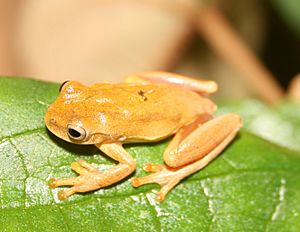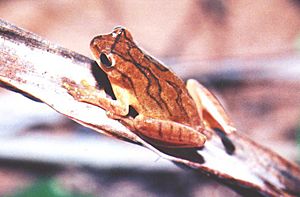Lesser treefrog facts for kids
Quick facts for kids Lesser treefrog |
|
|---|---|
 |
|
| Conservation status | |
| Scientific classification | |
| Synonyms | |
|
The Lesser Treefrog (scientific name: Dendropsophus minutus) is a small frog that belongs to the Hylidae family, also known as tree frogs. You can find these tiny frogs in many countries across South America, including Argentina, Bolivia, Brazil, Colombia, Ecuador, French Guiana, Guyana, Paraguay, Peru, Suriname, Trinidad and Tobago, Uruguay, and Venezuela. In Spanish, people often call it ranita amarilla común, which means "common yellow frog."
Where Lesser Treefrogs Live
Lesser Treefrogs live in many different places. Their natural habitats include dry and moist forests, both in lowlands and on mountains. They also live in dry and moist savanna areas. You might find them in grasslands that get wet or flooded during certain seasons.
These adaptable frogs also live near water sources. They can be found in temporary freshwater marshes, which are wet, grassy areas. They also live in places changed by humans, like pastureland (where animals graze), rural gardens, and even urban areas. They are often seen near ponds, canals, and ditches. Scientists have found them living from sea level all the way up to 2,000 meters high.
Appearance and Variety
Because this frog lives across such a huge part of South America, individual Lesser Treefrogs can look quite different from each other. Their colors and patterns can vary a lot depending on where they live. In 2014, a large group of 30 scientists studied the mtDNA (which is like a special genetic code found in the powerhouses of cells) of this frog. They discovered that the species had 47 different groups within it, showing just how diverse these frogs are!
Reproduction and Life Cycle
During the time when frogs breed, male Lesser Treefrogs find good spots near water. They often sit on grass and shrubs close to ponds or on plants that are in the middle of the water. These male frogs can be quite protective of their favorite spots. They might even compete with other males to keep their chosen perches.
Once a male and female frog mate, the female lays her eggs in still water. This usually happens in calm places like ponds and puddles. The eggs will then hatch into tadpoles, which will later grow into adult frogs.
See also
- Dendropsophus goughi, the Guianan dwarf tree frog



